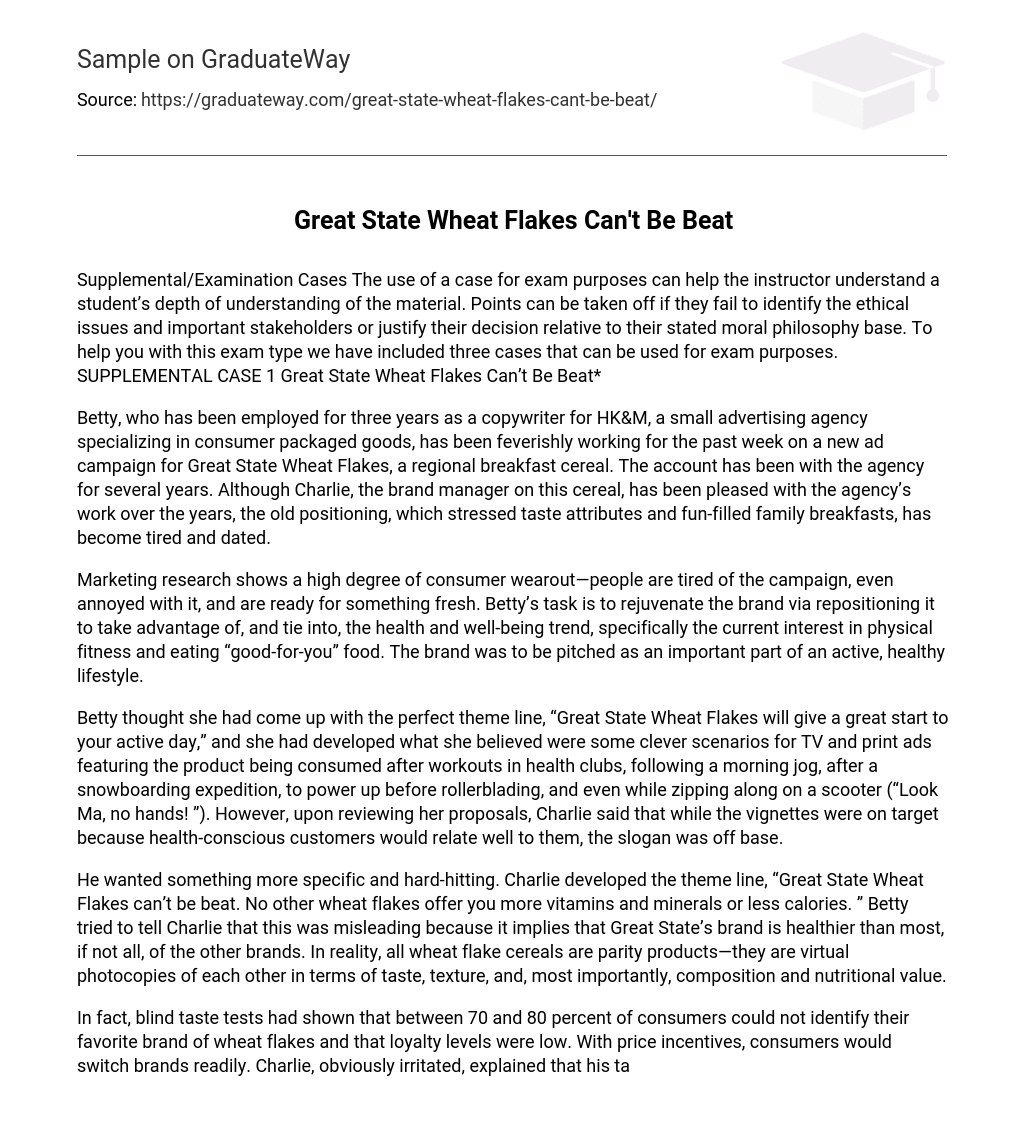Betty, who has been employed for three years as a copywriter for HK&M, a small advertising agency specializing in consumer packaged goods, has been feverishly working for the past week on a new ad campaign for Great State Wheat Flakes, a regional breakfast cereal. The account has been with the agency for several years. Although Charlie, the brand manager on this cereal, has been pleased with the agency’s work over the years, the old positioning, which stressed taste attributes and fun-filled family breakfasts, has become tired and dated.
Marketing research shows a high degree of consumer wearout—people are tired of the campaign, even annoyed with it, and are ready for something fresh. Betty’s task is to rejuvenate the brand via repositioning it to take advantage of, and tie into, the health and well-being trend, specifically the current interest in physical fitness and eating “good-for-you” food. The brand was to be pitched as an important part of an active, healthy lifestyle.
Betty thought she had come up with the perfect theme line, “Great State Wheat Flakes will give a great start to your active day,” and she had developed what she believed were some clever scenarios for TV and print ads featuring the product being consumed after workouts in health clubs, following a morning jog, after a snowboarding expedition, to power up before rollerblading, and even while zipping along on a scooter (“Look Ma, no hands! ”). However, upon reviewing her proposals, Charlie said that while the vignettes were on target because health-conscious customers would relate well to them, the slogan was off base.
He wanted something more specific and hard-hitting. Charlie developed the theme line, “Great State Wheat Flakes can’t be beat. No other wheat flakes offer you more vitamins and minerals or less calories. ” Betty tried to tell Charlie that this was misleading because it implies that Great State’s brand is healthier than most, if not all, of the other brands. In reality, all wheat flake cereals are parity products—they are virtual photocopies of each other in terms of taste, texture, and, most importantly, composition and nutritional value.
In fact, blind taste tests had shown that between 70 and 80 percent of consumers could not identify their favorite brand of wheat flakes and that loyalty levels were low. With price incentives, consumers would switch brands readily. Charlie, obviously irritated, explained that his tag line was an honest exaggeration—what the advertising trade termed “puffing”—and that consumers are expected to see through it. He felt that it offered the point of difference needed to increase brand loyalty. Betty, feeling uneasy, approached her boss Steve, the copy chief at HK&M, asking his counsel.
Steve explained that Charlie’s suggested slogan was an “implied superiority” claim. Steve explained that such claims are commonly made for commodity brands. They stake out a parity position which does not claim to be superior to, but only as good as, other brands, while using copy that suggests or implies superiority for the named brand. He cited several current and classical examples, such as
- “Nothing else cleans better,”
- “The maximum fluoride protection in any toothpaste,”
- “You can’t beat the savings,”
- “You can’t buy a more effective pain reliever,”
- “Nothing is proven to work better or last longer”
Steve reminded Betty that there is a distinction between deceptive advertising, which creates false impressions and misleads a consumer acting reasonably, and “trade puffing,” which is exaggerated praise of the product (e. g. , Almost Home cookies are the “moistest, chewiest, most perfectly baked cookies” ever; “Nestle makes the very best chocolate”). Puffery is viewed as acceptable in a society of the superlative. Consumers are assumed to see through the exaggeration or at least engage in a “willing suspension of disbelief.
He explained to her that whereas deceptive advertising is illegal, the Federal Trade Commission, which monitors national advertising for accuracy and fairness in claims, views puffery as legitimate. “What’s more,” Steve concluded somewhat sarcastically, “using your line of reasoning, Betty, we shouldn’t advertise parity products at all, since all brand advertising is designed to create a brand distinction in the buyer’s mind. Advertising is necessary to differentiate yourself from the pack of imitators. And it helps a small, underdog brand like Great State get a leg up on its big, deeppocketed competitors.
Betty thought that Steve’s comment might, indeed, have some merit. In fact, she feared that it might force Great State’s competitors to improve and differentiate their cereals, thereby benefiting consumers (but harming Great State). Nonetheless, she still felt uneasy. It seemed to her that the “implied superiority” claim crossed the boundary of puffery over to deception.
QUESTIONS FOR DISCUSSION
- Identify the ethical issues facing Betty regarding the nature of the proposed “implied superiority” advertising claim.
- What are the ethical issues Betty encounters with respect to organizational relationships and conflicts?
- What are Betty’s possible decision alternatives, and what are the ethics of each alternative?
- Which alternative would you recommend to Betty and why?





